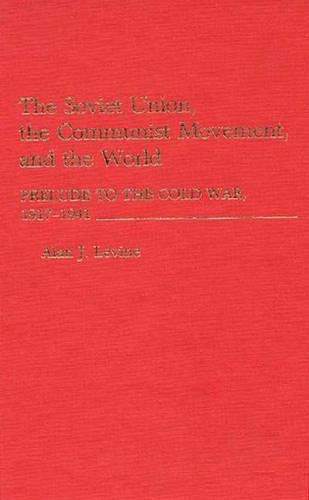
The Soviet Union, the Communist Movement, and the World: Prelude to the Cold War, 1917-1941
(Hardback)
Publishing Details
The Soviet Union, the Communist Movement, and the World: Prelude to the Cold War, 1917-1941
By (Author) Alan Levine
Bloomsbury Publishing PLC
Praeger Publishers Inc
8th February 1990
United States
Classifications
Tertiary Education
Non Fiction
International relations
327.47
Physical Properties
Hardback
189
Description
In this volume, Alan Levine traces the development of the Soviet Union and the Communist movement from 1917 to the Nazi invasion of the USSR in June 1941. Arguing that the Cold War between the Soviet Union and the Western democracies can only be fully understood by examining the doctrine and practices of the Soviet Union and the world Communist movement from their inception, Levine offers a detailed account of the development of the state parties in Russia and China, the Communist seizure of power, the Soviet Union's role in international relations between the two world wars, and the development of the techniques of conflict management used by the Communist powers later in the era of the Cold War. By treating together a number of topics and elements that are closely related but usually treated separately, Levine offers insights into the origins of the Cold War, showing that the devices used successfully by the Soviet state during these years - building satellite states, the use of "proxy" forces to influence the outcomes of revolutions, the use of Soviet military aid, and the inconspicuous employment of Soviet "advisors" - were already seen in the 1920s and 1930s. Levine stresses throughout the continuity exhibited by Soviet policies between the world wars and those used during the Cold War after World War 2. He examines such topics as Soviet foreign policy and territorial expansion, the development of Communist movements and doctrines, the successes and failure of the Communists' enemies, the history of the Russian and Chinese revolutions, and the history of Communist attempts to seize power. Based on his analysis, Levine concludes that rather than beginning in 1945, following the end of World War 2, the Cold War actually had its origins in the development of a totalitarian Communist regime in the former Russian Empire under the shattering impact of World War 1. Levine argues further that there has also been a strong element of continuity in the characteristic features of Western responses to the Soviets. Students of 20th century international politics should find this work of interest.
Author Bio
ALAN J. LEVINE is an historian specializing in Russian history and the study of twentieth-century international relations. A freelance writer and reviewer, he has written numerous articles on World War II and the Cold War.
